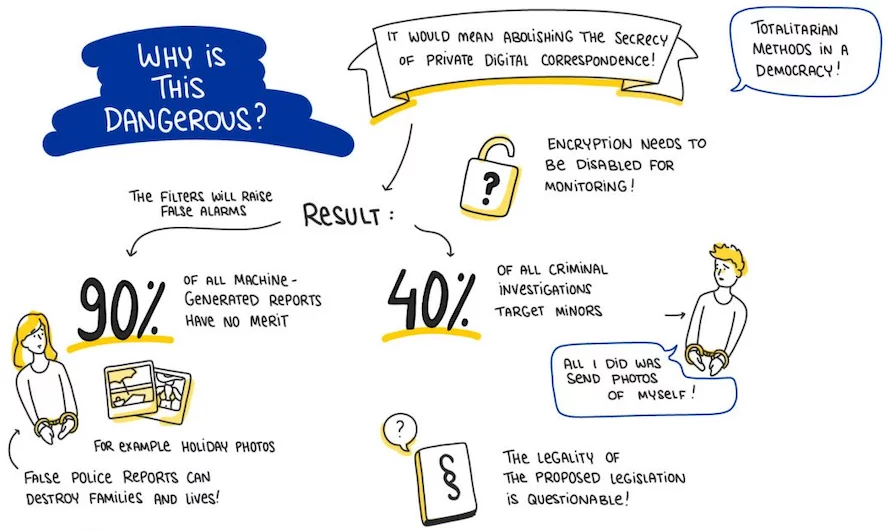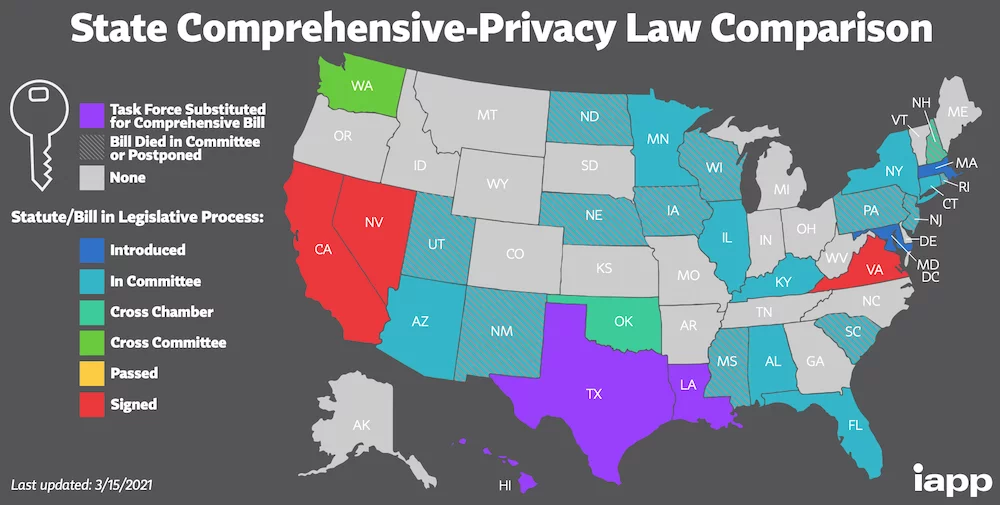More and more frequent attempts are being made to overreach when it comes to privacy controls. Some of the reasoning behind proposals like the most recent #chatcontrol might even seem to be based on legitimate concerns. Though what would be relinquished in exchange for this ‘security’ is simply too costly to consider.

Private corporations are becoming evermore intrusive as the digital age evolves. While governments are here to serve us, actors from the private sector typically have much less obligation to exercise any restraint when it comes to respecting individual’s privacy in an evermore digital world.
🇩🇪 Die EU plant mit der #Chatkontrolle die anlasslose Echtzeit-Massenüberwachung aller deiner E-Mails und Nachrichten mit Meldung verdächtiger Inhalte an die Polizei. Worum es geht, zeigt unser Video.
— Patrick Breyer #JoinMastodon (@echo_pbreyer) March 15, 2021
Rette das #digitaleBriefgeheimnis: https://t.co/AbQM2y0hXP pic.twitter.com/FqTRGrwGHY
As it turns out, some data privacy news is making recent headlines in the US as well. On March 2, 2021, the Consumer Data Protection Act (VCDPA) was signed into law in Virginia. Now the second state behind California to enact comprehensive consumer privacy legislation. The Virginia Consumer Data Protection Act will go into effect on January 1, 2023.
The VCDPA creates a rights-based regime similar to the EU’s GDPR and California’s CCPA. In that vein, the VCDPA provides six specific rights for Virginia consumers:
• The right to access their data
• The right to correct their data
• The right to delete their data
• The right to data portability
• The right to opt-out of certain uses of their data, including sale, targeted advertising, and other forms of profiling
• The right to appeal a controller’s decision with regard to a consumer’s request to invoke the rights listed above.
While this may be positive for Virginia, it also highlights how big an issue data privacy remains for the rest of the United States due to there being no clear, blanket regulatory framework.

Most of the US still lacks any kind of data privacy law. Other states now likely to follow California and Virginia’s emphasis on privacy as soon as this year include Colorado, Connecticut, Florida, New York, Minnesota, Oklahoma, Ohio and Washington. This appears to be a step in the right direction, but it’s also a bit confusing when paired with news like #chatcontrol and it’s consequences.
Of course we’re talking about two different countries here, but at the end of the day we’re also discussing the likely shared fate of our collective world wide web. What good is an individual having their data under ‘control’, made ‘safe’, and kept ‘private’ only in principle, and only from designated groups? Without encryption, without the potential for true privacy, none of this would actually be the case. If the data we’re presumed to have control over is being made off limits for mega-corps to build user models, sell more ads, and guide social behavior, then what is it being gathered for, and by who?
Majority of the European Parliament welcomes the Commission's intention to oblige e-mail, messaging and chat providers to search all private messages for allegedly illegal material and report to the police (#chatcontrol) by 580:76:37. pic.twitter.com/Z9A2VIW0TT
— Patrick Breyer #JoinMastodon (@echo_pbreyer) March 13, 2021
“The End of the Privacy of Digital Correspondence”“The EU wants to have all private chats, messages, and emails automatically searched for suspicious content, generally and indiscriminately. The stated aim: To prosecute child pornography. The result: Mass surveillance through fully automated real-time messaging and chat control and the end of secrecy of digital correspondence.”- Patrick Breyer
Some people have devoted their lives to emphasizing an individual's right to data privacy, as well as the gaining and retaining of crucial freedoms. People who have had plenty of time to think this through. Probably not a bad idea to revisit their most essential takeaway on such matters...
“If we don’t have privacy, what we’re losing is the ability to make mistakes, we’re losing the ability to be ourselves. Privacy is the fountainhead of all other rights. Freedom of speech doesn’t have a lot of meaning if you can’t have a quiet space, a space within yourself, your mind, your community, your friends, your family, to decide what it is you actually want to say.”"Arguing that you don’t care about privacy because you have nothing to hide is like arguing that you don’t care about free speech because you have nothing to say.”“Because privacy isn’t about something to hide. Privacy is about something to protect. That’s who you are.”"Privacy is baked into our language, our core concepts of government and self in every way. It’s why we call it 'private property.' Without privacy you don’t have anything for yourself."- Edward Snowden
Patrick does a great job breaking this all down. Be sure to check out his twitter, follow, and share.
<blockquote class="twitter-tweet"><p lang="en" dir="ltr">Majority of the European Parliament welcomes the Commission's intention to oblige e-mail, messaging and chat providers to search all private messages for allegedly illegal material and report to the police (<a href="https://twitter.com/hashtag/chatcontrol?src=hash&ref_src=twsrc%5Etfw">#chatcontrol</a>) by 580:76:37. <a href="https://t.co/Z9A2VIW0TT">pic.twitter.com/Z9A2VIW0TT</a></p>— Patrick Breyer #JoinMastodon (@echo_pbreyer) <a href="https://twitter.com/echo_pbreyer/status/1370642492899667968?ref_src=twsrc%5Etfw">March 13, 2021</a></blockquote> <script async src="https://platform.twitter.com/widgets.js" charset="utf-8"></script>


